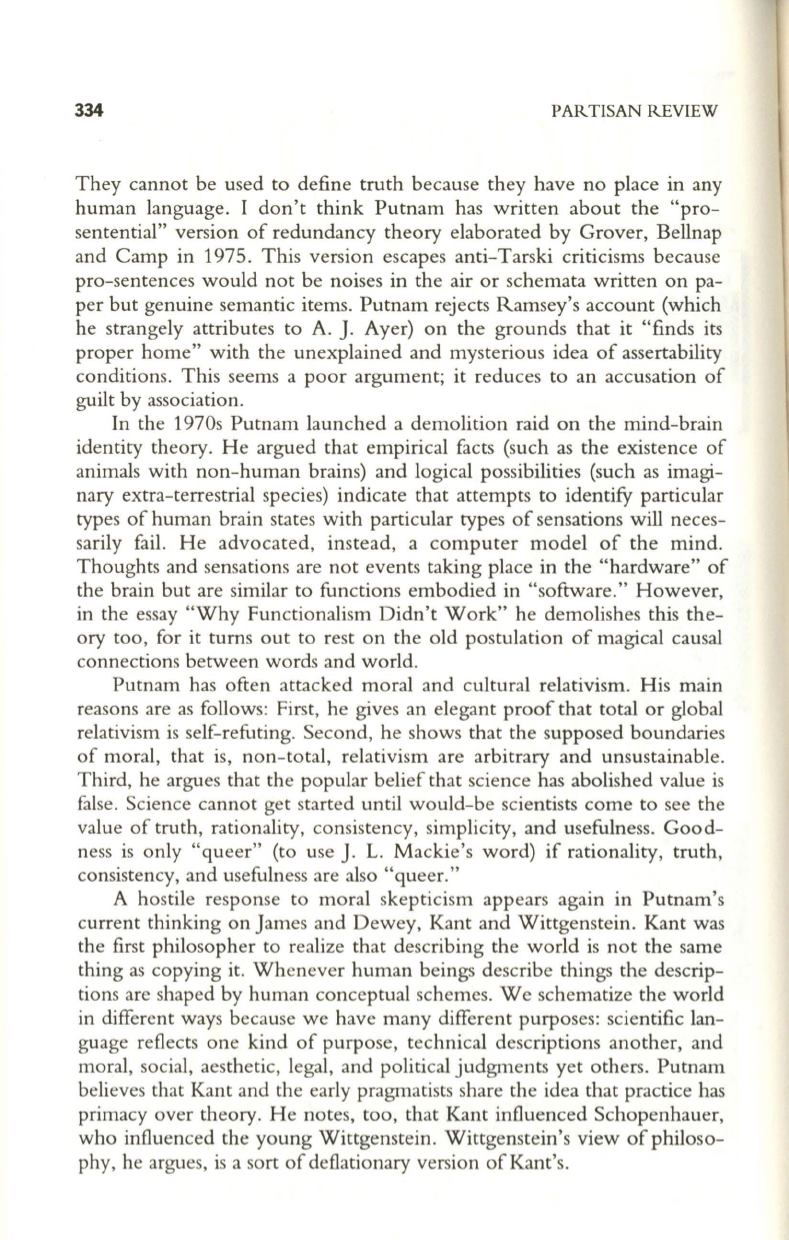
334
PARTISAN REVIEW
They cannot be used to define truth because they have no place in any
human language. I don't think Putnam has written about the "pro–
sentential" version of redundancy theory elaborated by Grover, Bellnap
and Camp in 1975. This version escapes anti-Tarski criticisms because
pro-sentences would not be noises in the air or schemata written on pa–
per but genuine semantic items. Putnam rejects Ramsey's account (which
he strangely attributes to A.
J.
Ayer) on the grounds that it "finds its
proper home" with the unexplained and mysterious idea of assertability
conditions. This seems a poor argument; it reduces to an accusation of
guilt by association.
In the 1970s Putnam launched a demolition raid on the mind-brain
identity theory. He argued that empirical facts (such as the existence of
animals with non-human brains) and logical possibilities (such as imagi–
nary extra-terrestrial species) indicate that attempts to identify particular
types of human brain states with particular types of sensations will neces–
sarily fail. He advocated, instead, a computer model of the mind.
Thoughts and sensations are not events taking place in the "hardware" of
the brain but are similar to functions embodied in "software." However,
in the essay "Why Functionalism Didn't Work" he demolishes this the–
ory too, for it turns out to rest on the old postulation of magical causal
connections between words and world.
Putnam has often attacked moral and cultural relativism. His main
reasons are as follows: First, he gives an elegant proof that total or global
relativism is self-refuting. Second, he shows that the supposed boundaries
of moral, that is, non-total, relativism are arbitrary and unsustainable.
Third, he argues that the popular belief that science has abolished value is
false. Science cannot get started until would-be scientists come to see the
value of truth, rationality, consistency, simplicity, and usefulness. Good–
ness is only "queer" (to use
J.
L.
Mackie's word) if rationality, truth,
consistency, and usefulness are also "queer."
A hostile response to moral skepticism appears again in Putnam's
current thinking on James and Dewey, Kant and Wittgenstein. Kant was
the first philosopher to realize that describing the world is not the same
thing as copying it. Whenever human beings describe things the descrip–
tions are shaped by human conceptual schemes. We schematize the world
in different ways because we have many different purposes: scientific lan–
guage reflects one kind of purpose, technical descriptions another, and
moral, social, aesthetic, legal, and political judgments yet others. Putnam
believes that Kant and the early pragmatists share the idea that practice has
primacy over theory. He notes, too, that Kant influenced Schopenhauer,
who influenced the young Wittgenstein. Wittgenstein's view of philoso–
phy, he argues, is a sort of deflationary version of Kant's.


